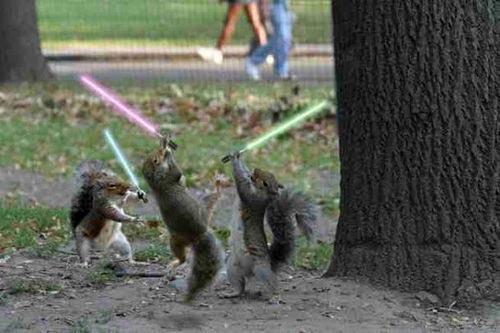Thirty years later, 'Star Wars' force still being felt
10:16 a.m. EDT, May 24, 2007
(CNN) -- What the studio executives couldn't see, 13-year-old Stephen Colbert saw all too clearly.
"We went to school the next day unable to explain to our friends how everything was different now," the "Colbert Report" host, now 43, says about his first viewing of "Star Wars" in the History Channel documentary "Star Wars: The Legacy Revealed."
How right he was.
"Star Wars," indeed, was a phenomenon -- one that caught most of Hollywood by surprise. Thirty years after its premiere on
May 25, 1977 (in just 32 theaters), it remains the model for the summer blockbuster -- and a touchstone for two generations of moviegoers.
With the film's 30th anniversary Friday, celebrations are kicking into high gear. Besides the History Channel special, set to air 9 p.m. ET Monday, there are:
- Several books (notably "The Making of Star Wars: The Definitive Story Behind the Original Film" [Del Rey]);
- "Star Wars" weekends at the Disney-MGM Studios theme park near Orlando, Florida;
- "Star Wars" Celebration IV, beginning Thursday in Los Angeles, California;
- 30th-anniversary action figures, released by Hasbro;
- A screening of all six films on Cinemax on Friday;
- And even "Star Wars" postage stamps, to go along with all those R2-D2 mailboxes that the United States Postal Service has installed around the country.
Not bad for a film rather unsensationally described in its own press kit as "an expression of [George Lucas'] boyhood fantasy life -- his love for 'Flash Gordon' and all the great mysteries and adventures in books and movies."
Given that press kits are usually chock-full of hyperbole, that somewhat timid portrayal may have indicated what studio execs, and even Lucas' friends, thought of the film.
After viewing a screening in March 1977, with the special effects still unfinished, Lucas' wife Marcia was aghast, according to Peter Biskind's 1970s movie history, "Easy Riders, Raging Bulls."
"It's the 'At Long Last Love' of science fiction," she said, referring to a well-known bomb of the time.
And the necessary special effects cost a fortune in 1977. Lucas' studio, 20th Century Fox, was nervous. "It was touch-and-go for a time," Lucas later recalled. (He wouldn't trust a studio again, creating his own company, Lucasfilm, to go along with his special-effects house, Industrial Light & Magic, for future endeavors.)
But moviegoers never doubted. The film was a hit from its first day, attracting such crowds of people that its opening was featured on Walter Cronkite's "CBS Evening News." Harrison Ford was practically ripped apart while shopping at a record store. The film's theme music, redone in disco form by a musician named Meco, became a No. 1 single.
The success of "Star Wars" paved the way for Lucas' entire empire, including massively successful merchandising tie-ins and five other films, broadening the "Star Wars" mythology.
Observers, from casual fans to Ph.D.-laden professors, have tried to explain the reasons for the films' success. Lucas had more than "Flash Gordon" on his mind when he started writing the first film in 1973; he had the myth-probing works of Joseph Campbell as well.
Lucas' universe incorporated such figures as the reluctant hero (Luke Skywalker), the reckless adventurer (Han Solo), the goofy sidekick (C-3PO, Jar Jar Binks) and -- perhaps most important -- the corrupted leader (Anakin Skywalker/Darth Vader). It's a mythology that has deep resonance.
"A hundred years from now someone will be sitting here discussing the impact of 'Star Wars' and they will be seeing different things in it than we are seeing today, just as today we have classes in the university on Homer," Joan Breton Connelly, who teaches "From the Iliad to 'Star Wars' " at New York University, says in "Star Wars: The Legacy Revealed."
Former NBC anchor Tom Brokaw is blunter.
"I thought 'Star Wars' was the quintessential Western played out in a different universe," he says in the History Channel documentary.
"Star Wars" changed the Hollywood universe as well.
Previous box-office kings -- "The Sound of Music," "The Godfather," '70s disaster movies, even "Star Wars" predecessor "Jaws" -- were aimed primarily at adults. "Star Wars" brought in a huge teenage market that went to movies over and over (and over) again. In the decades since, this has become Hollywood's blockbuster template.
In a recent columnexternal link, Atlanta Journal-Constitution film critic Eleanor Ringel lamented how "Star Wars" and "Saturday Night Fever" helped kill the so-called '70s golden age, when movies ranging from "The Godfather" to "The Sting" to "Shampoo" could be both critical and box office successes.
"Goodbye, Don Corleone and Travis Bickle. Hello, Obi-Wan Kenobi and Tony Manero. Move over, Little Italy and Nashville. All roads now lead to Tatooine and Brooklyn," she wrote.
And though the second "Star Wars" trilogy -- "The Phantom Menace," "Attack of the Clones" and "Revenge of the Sith" -- did huge business, many fans prefer the first three films. (Most rate the second film, 1980's "The Empire Strikes Back," best; it's no coincidence that it had a script written by Lawrence Kasdan and sci-fi legend -- and noted screenwriter -- Leigh Brackett.)
Nevertheless, Lucas and his collaborators succeeded in creating a legacy.
"It is bad guys versus good guys, and everyone wants to see that story," says director -- and hardcore "Star Wars" fan -- Kevin Smith in the documentary. "That story will never grow tired, never grow old."

